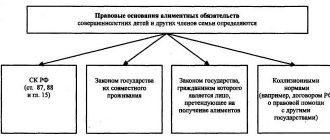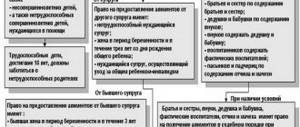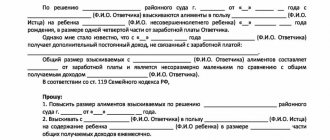Home » Alimony » Jurisdiction of a claim to change the amount of alimony
1
You will have to fulfill your child support obligations for a long time – until the child reaches adulthood. During the payment period, the life circumstances of the payer and the recipient may change significantly. This entails the need to adjust the amount of alimony down or up.
If an agreement has been concluded between the parties, the conditions for maintaining the child can easily be changed by mutual consent of the mother and father. If consensus could not be reached, or the withholding of alimony had to be formalized through the court, a repeated appeal to the judicial authority is inevitable. Then the question of jurisdiction arises: where to file a claim to change the amount of alimony payments?
General provisions
Before you go to the institution where you are applying, there are several important points to consider:
- Courts are reluctant to reduce payments for minors and minors;
- There must be compelling reasons for claims to be granted;
- All grounds must be supported by documents.
Taking all this into account, one can subjectively assess the prospects of the case. But before drawing up and submitting an application, it is recommended to negotiate and convince the child’s guardian (usually his mother) that the payer is right. It is not necessary that the ex-spouses have bad relations that prevent them from finding a solution that will satisfy both parties.
Most often, a compromise is impossible if the payer intends to unjustifiably reduce the amount of alimony. In this case, the chances of winning in court are small, and the claims will be rejected. A positive court decision is possible if:
- There are two or more reasons for reducing the size;
- They are based on direct rules of law (for example, Article 81 of the RF IC);
- There are documentary justifications.
On the other hand, if you manage to convince your ex-wife with arguments, then you won’t have to apply anywhere for a reduction in alimony. You can change the amount of payments by agreement, which :
- Drawed up and signed by the child’s parents in free form;
- Makes changes to the current payment procedure and/or amount of alimony;
- Certified by a notary.
The statement is true if the payments were determined not by the court, but according to a previously drawn up and signed agreement. Otherwise you will have to go to court . However, here too the consent of the ex-wife plays a key role. If she is not against the proposed option, it is enough to submit an application and the court will issue an order within 5 working days on a new procedure and amount of payments.
If, during the consideration of the application, the judge comes to the conclusion that the interests of the child are being violated, and the stated requirements need to be studied thoroughly, the application will be returned with an indication of the reason. Then you will have to draw up a claim and send it for consideration in a full court hearing.
A special case is when alimony is paid voluntarily. On the one hand, the absence of an agreement or a court decision does not require any ceremony; the recipient of the money can be presented with a fait accompli.
But this can cause the following chain of negative consequences :
- Dissatisfaction of the recipient of the money.
- His filing a lawsuit demanding payment of alimony for the previous three years.
- There is no evidence that the money was transferred and that these were payments for the financial support of the child.
- Satisfaction of the claim.
In this situation, instead of asking where to apply for a reduction in alimony, the payer will be interested in how to get away with minimal financial losses. Therefore, he needs to behave even more delicately if the issue of payments has not previously been resolved either by agreement, order or court decision.
If jurisdiction is violated
When a claim is received, the judge considers the possibility of accepting it for proceedings within 5 days. If the document should be considered in a different order, the judge rejects the application and issues an appropriate ruling.
If the application was accepted, and later it turned out that jurisdiction was violated, the document is transferred to another court at the place of residence of the plaintiff or defendant.
For example , the defendant is summoned to court, but it turns out that he no longer lives there. A ruling is made to transfer the case and all materials on it to another court where the defendant is registered.
Judicial practice on the jurisdiction of cases of changing the amount of alimony is ambiguous. Often, due to incorrect interpretation of legislative acts, citizens turn to the wrong address. This leads to a delay in the decision-making process.
A waste of time can be avoided if you initially seek advice from a lawyer at ros-nasledstvo.ru. He will tell you which court will hear the case, what documents need to be submitted, how to properly file a claim in order to achieve a result as soon as possible.
FREE CONSULTATIONS are available for you! If you want to solve exactly your problem, then
:
- describe your situation to a lawyer in an online chat;
- write a question in the form below;
- call Moscow and Moscow region
- call St. Petersburg and region
Save or share the link on social networks
- FREE for a lawyer!
Write your question, our lawyer will prepare an answer for FREE and call you back in 5 minutes.
By submitting data you agree to the Consent to PD processing, PD Processing Policy and User Agreement
Useful information on the topic
13
Application for non-payment, collection of arrears of alimony to bailiffs
Regarding issues of alimony payments, you should not communicate with bailiffs...
2
Statement of claim for a reduction in the amount of alimony
If you cannot agree with the alimony recipient to reduce the amount...
1
How to collect alimony if the husband does not officially work
Lack of work is not a valid reason for not...
7
How to refuse child support
The direct possibility of completely officially abandoning already paid alimony legislation...
2
What documents are needed to submit and register child support?
Documents are what is needed to receive alimony payments. List…
2
What to do if the child’s father, ex-husband, alimony provider does not pay child support
Keeping a child is an expensive pleasure: food, toys, clothes...
Reasons
The more reasons, each of which provides a reason to satisfy the payer’s demands, the higher the likelihood of pre-trial or judicial settlement of the dispute. The presence of one reason is not enough to ask the question of where to apply for a reduction in payments for family obligations. It is recommended to take another look at the situation in your family and work in order to present other reasons to the court that would allow you to reduce the amount of payments.
For example, they often go to court on a raised issue on the grounds that the payer has given birth to another child. Indeed, in accordance with the above article of the RF IC, it is necessary to pay from the total income of the parent:
- If there is one child - a quarter;
- If there are two children, 1/6 for each.
The birth of a second child is a good reason to reduce payments by a third. However, a competent defense of the defendant will be able to prove the following:
- The second child is better off.
- If the amount of child support is reduced, the first child will receive less material benefits than the second.
The courts take these arguments into account and reject the claims. The appeal and cassation leave the decision of the first instance unchanged. The way out of the situation is a combination of interrelated reasons. Other reasons besides having children :
- Deterioration of the payer’s health, due to which he requires additional and considerable costs for medications and treatment;
- Inability to engage in previous professional activities due to poor health, which causes a decrease in total income;
- Loss of your previous job and inability to find a new one.
In addition, reasons can be provided by changes and events occurring in the life of the child to whom the money is transferred, namely:
- He got a job or started doing business, which means he needs less financial help.
- He received property that brings him constant and significant income.
These reasons and events are not exceptional. Before submitting your application, you can read in more detail about the grounds for reducing alimony in this article.
Contents of an application for exemption from alimony payments
A statement of claim must be drawn up in accordance with the requirements of the Civil Procedure Code of the Russian Federation. The statement of claim must be submitted in writing.
The application must indicate to which court the application is being submitted, the details of the plaintiff (full name, address) and the details of the defendant (also full name, address). The main part should state the reasons why exemption from alimony obligations is possible , that is, a change in the marital or financial situation of any party (for example, re-registration of marriage by one of the former spouses and the appearance of a second child; incapacity of the alimony payer).
other circumstances as grounds : such as the disability of one of the family members, his temporary incapacity for work, as well as the child’s employment.
When drawing up an application, you must take into account that any circumstance that may affect the financial situation of one of the parties can be recognized by the court as sufficient evidence for exemption from paying alimony. In this regard, it seems important to indicate in detail such circumstances in the statement of claim.
The statement of claim should refer to the current legislation, in particular to the provisions of Art. 119 and art. 120 IC RF. Since such cases are considered within the framework of civil proceedings, it is necessary to make a reference to the article of the Civil Procedure Code of the Russian Federation - Art. 131 Code of Civil Procedure of the Russian Federation.
The final part of the application indicates the cost of the claim, lists the attachments, date, and signature.
There is one more reason for which alimony can be cancelled : this is the case when the child moves to live with the plaintiff. In such a situation, it turns out that the alimony payer is obliged to fully support the child. In this regard, in order to relieve yourself of the obligation to pay alimony, you need to go through the procedure of filing a claim in court and stopping the payment of alimony through the courts . In this case, it is also possible to file an additional claim for the recovery of child support from the other spouse.
Example
Tronov V.A. In 2012, he applied to the court for exemption from paying alimony. In 2002, Tronov V.A. divorced his wife Ivashchenko L.I. Moreover, their child is M.V. Tronova. stayed to live with her father. In 2010, Tronova M.V. moved to live with her mother, in connection with which Ivashchenko L.I. filed an application to court for alimony.
Based on the court decision, Tronov V.A. paid alimony. However, after living with her mother for a year, Tronova M.V. in 2011 she returned to live with her father. Considering the statement of Tronov V.A. the court decided that the exemption from payment of alimony by Tronov V.A. is legal, since the child is supported by him, and alimony payments go to his ex-wife - Ivashchenko L.I.
Application and other documents
The main one is the claim with which the applicant goes to court. The statement is true if it is impossible to do without taking the dispute to the courtroom. Other two documents that allow you to reduce alimony:
- Application to court.
- Agreement between the child's parents.
But before filing appeals to the court or suggesting that the ex-wife change the current conditions, it is necessary to prepare an evidence base . It allows you not only to substantiate the claim, but also to build a reasoned conversation with the child’s mother. This increases the chances that former spouses will be able to find common ground without going to trial.
Such documents include certificates and certificates that confirm the need to reduce alimony due to:
- The arrival of a new child;
- Poor health;
- Loss of ability to work and work;
- The appearance of income for the baby.
For example, to prove the need to reduce child support due to the birth of a second child, you must provide evidence:
- On the dissolution of marriage with the mother of the first-born.
- About the birth of the first and second child.
- About marriage with the mother of the second baby (if any).
Additionally, you need to submit a document fundamental for calculating payments: a court decision or order, an agreement between the parents.
In addition, you must provide the following information :
- About the salary from the place of work of the payer and the mother of the second child.
- From the mayor's office about the level of minimum and average wages in the region where both children live.
- From the bank about current debt on loan obligations.
In case of illness and disability, some of the above certificates and certificates are replaced:
- The conclusion of a medical social examination on disability.
- Documents about prescribed treatment and a list of medications.
- Official response from pharmacies about the average cost of drugs.
- Calculation of the cost of monthly, six-month, annual treatment based on the use of drugs, as well as other necessary treatment methods.
Before deciding where to apply for a reduction in alimony, there will be painstaking work to collect evidence and pre-trial settlement of the dispute.
An appeal to the court, including a statement of claim, is carried out based on the result of the work done, which did not lead to a pre-trial settlement of the dispute or did, but it is impossible to do without a trial. Ignoring the previous stages and expedited filing of a claim increases the risk of denial of the applicant’s claims.
Do you need to file a claim to reduce the amount of alimony? We advise you to read the special material prepared by the site’s editors.
Is it possible to reduce the amount of alimony?
It is possible, provided that the circumstances under which alimony payments were established have changed.
If alimony was collected through the court, then in order to reduce the monthly payment it is necessary to contact the judicial authority.
When drawing up an agreement, changing the size is possible voluntarily (by agreement of the parties) or through the court (unilaterally).
A voluntary change requires contacting a notary office. But the amount of payment cannot be less than the amount that would be assigned by the court. That is, the notary will refuse to certify the agreement if the parties have significantly reduced the monthly payment.
The previously established regime can be reduced regardless of how alimony payments were assigned by the court: a fixed amount, or a share of income.
Complete the survey and a lawyer will share a plan of action for alimony in your case for free.
You might find it useful:
Child support calculator
Penalty calculator
Samples of documents on alimony
Legal advice on alimony
Where should a claim be filed to reduce the amount of alimony?
When drawing up and filing a claim, it is necessary to take into account the jurisdiction of such cases. In addition, changes in legislation must be taken into account. As a general rule, the plaintiff is obliged to contact the magistrate, clause 1.4 of Article 23 of the Code of Civil Procedure of the Russian Federation (hereinafter referred to as the Code). You can find mention of alternative jurisdiction for this category of cases, on the basis of which the applicant can appeal to the district court . However, this is an incorrect interpretation of procedural rules.
Indeed, Article 24 of the Code provides for the consideration of cases by district courts, but it specifies exceptions, which include disputes over family law relations. Exceptions include cases involving the following:
- Challenging or establishing maternity (paternity);
- Deprivation or restriction of parental rights;
- Adoption of children.
This norm also contains reference to other disputes that concern minors and minors. As a result, it turns out that the same norm of the Code (clause 1.4 of Article 23):
- Provides for the jurisdiction of magistrates over disputes that arise from family legal relations;
- Allows consideration of “other disputes” that involve children.
What is the correct answer to the question of where to file a claim to reduce alimony? As a general rule, such cases are considered by the court. In exceptional cases, if the need can be competently substantiated, the district court will do so. You will have to prove that the dispute about reducing the amount of alimony relates to “other” cases of children that fall under the exception from consideration by the magistrate.
Another controversial issue is the location of the institution where the plaintiff applies. The direct rule (Article 28 of the Code) establishes the requirement that cases are considered at the defendant’s place of residence . There are cases when the plaintiff can choose the court at his own discretion, namely:
- The defendant's place of residence is unknown;
- Alimony is established by agreement between the spouses; the application can be submitted at the place of execution;
- Several courts have jurisdiction over the case, and the applicant has the right to choose any of them.
These are special cases and are considered individually in court; a request to change jurisdiction may be refused. The basis is a direct norm of the Code, which provides for an appeal to the magistrate at the defendant’s place of residence.
The plaintiff will have to justify each of these cases with documentary evidence. For example, an unspecified place of residence will have to be confirmed by correspondence:
- With a representative of the management company servicing an apartment building in which a mother and child previously lived;
- With an alimony recipient who has stopped responding and accepting letters at a previously known address;
- With the employer of the child's mother.
The content of the letters must clearly indicate that the defendant previously lived at the specified address, but moved out and did not leave information about his stay.
How is place of residence determined when filing a claim?
Citizens taking part in the trial may reside at the place of registration or in another place in fact.
According to the legislation (Article 20 of the Civil Code of the Russian Federation, Law of the Russian Federation No. 5242-1 of June 25, 1993 “On the right of citizens to freedom of movement...”), a person’s place of residence is determined by the following criteria:
- Availability of premises. This can be a residential building, other premises suitable for living, where a citizen stays most of the time legally: as an owner, under a rental agreement.
- Duration of residence: permanent or primary stay in the specified premises.
- Availability of documents on the basis of which the use of residential premises is made.
If a citizen is incapacitated, his place of residence is determined as the place of residence of the guardian.
The judicial authority assumes that the citizen’s place of residence coincides with the place of registration. If the plaintiff or defendant temporarily settled in another premises (hotel, friends' house, boarding house, hospital and other buildings suitable for habitation) for a period of more than 90 days, they can register at the place of stay.
Compliance with the rules of registration and deregistration will allow you to:
- contact the judicial authorities at the place of actual location;
- receive subpoenas, notices, notifications.
At the same time, previously completed registration at the place of residence is not cancelled. Registration is one of the ways to monitor the movements of citizens.
Persons living in residential premises, but not registered, are not deprived of the right to apply to the court at their place of residence. Otherwise it will violate Art. 48 of the Constitution of the Russian Federation, which states that every citizen has the right to receive qualified legal assistance.
In the absence of registration, the fact of residence in a certain place must be proven, that is, provide to the court a lease agreement, rental agreement, a certificate from work about staying at a certain time in a specific place.
If a citizen lives in different places for short periods of time, the claim must be filed where he is registered.
In judicial practice, there are cases when a citizen files a claim, having issued a temporary registration, and does not violate the rules of jurisdiction, but when a decision is made, it turns out that the registration period has expired. In such cases, Art. 33 Code of Civil Procedure of the Russian Federation. If a case is accepted for consideration by a judicial authority, according to the rules, the same court must resolve it on its merits, even if the case later becomes subject to the jurisdiction of another court.
Based on the information provided, we can conclude that registration at the place of residence when filing a claim is a desirable, but not mandatory, condition. In its absence, you will have to submit documents confirming the right to stay in residential premises for a certain period of time.
Case resolution practice
When determining the place of filing a claim, the courts proceeded from the above norm of the Code (clause 1.4 of Article 23). On this basis, it is generally accepted practice that this category of cases is considered by a magistrate.
However, in addition to satisfying the requirement to reduce the amount of payments, the claims may include:
- Recognition of paternity/maternity;
- Deprivation or restriction of parental rights;
- Adoption of children.
In such cases, the magistrates' courts refused to consider the claim and indicated the jurisdiction of the case to the district court.
Wrong decisions occur. Thus, a judge in the Trans-Baikal Territory refused to accept the claim, justifying his position as follows:
- Alimony was previously ordered by the district court;
- The norm of the Code (Article 203) provides for a change in the procedure for implementing a decision by the institution that made it.
The appeal recognized such conclusions as incorrect and returned the case to the magistrate. Arguments - such a statement is required by litigation, in which the issue is clarified not about changing the procedure for executing a court decision, but about changing the amount of previously established payments.
When filing an application to reduce the amount of alimony, the plaintiff has the right to combine it with other related claims.
Thus, the judge of the city of Chita refused to consider in full the claim with the following requirements:
- Divorce the marriage.
- Collect alimony.
- Determine the place of residence of the children.
- Divide the property of the spouses.
By court ruling, the application was returned in the first two parts. The panel of judges overturned this decision, pointing out that the applicant has the right to combine several related claims in one claim. Grounds – provisions of Part 1 of Article 151 of the Code.
A comprehensive review of judicial practice on reducing alimony is provided in this material.
Procedure for filing an application for exemption from alimony payments
both the alimony payer and the recipient can apply for exemption from paying alimony . But in practice, situations usually arise that the payer submits an application to cancel or reduce alimony.
In order to submit an application, jurisdiction must be determined. Most often, a statement of claim is filed at the defendant’s place of residence, but the law does not exclude the possibility of filing an application for exemption from alimony payments to the court where the decision to collect was made. This category of cases falls under the jurisdiction of magistrates.
Having drawn up an application and collected all the necessary documents confirming the possibility of canceling alimony, you must pay the state fee. Attach the receipt to the application. It is necessary to pay attention to the fact that two packages of documents are submitted to the court - one remains directly in court, and the second is sent to the defendant.
As for the limitation period it does not apply to this category of cases , that is, the plaintiff can apply for exemption from paying alimony at any time. However, if an agreement on the payment of alimony was concluded between the parties, then the statute of limitations is three years from the date of termination of the said agreement.
So, having collected a package of documents, you need to take them to the court in person and hand them over to the office or send all the documents by mail with notification. Within five days after filing the documents, the court must make a decision to consider the claim and set a time for the court hearing.
What does the court pay attention to when considering an application for exemption from alimony payments? First of all, on the weight of evidence confirming the possibility of canceling alimony obligations. That is why it is necessary to carefully collect the evidence base - that is, all the necessary documents.
During the trial, it will not be a bad idea to provide testimony from witnesses. However, in any case, the court will take into account the interests of the child and proceed from what his financial support will be. Prosecutor's offices and guardianship authorities are often involved in this category of litigation, since the abolition of alimony obligations may violate the child's right to material support.
It is worth noting that until the court decision on exemption from alimony comes into force, the payer is obliged to fulfill alimony obligations.
Example
In 2014, citizen N.I. Komarov filed a claim with the court for exemption from paying alimony. In the motivational part of the statement, Komarov N.I. indicated that, by court decision, he has been paying alimony for his daughter, who lives with his ex-wife, Levina O.A., for 5 years.
However, citizen Levina O.A. recently entered into a new marriage. Levina's husband O.A. is an individual entrepreneur and has a stable high income. In this regard, Komarov N.I. asks the court to exempt him from paying alimony for his daughter, believing that the stepfather is currently able to provide for her financially.
Considering this case, the court rejected N.I. Komarov. in satisfying the claims, referring to the fact that the father of the child is N.I. Komarov, while the stepfather is not the adoptive parent. Accordingly, it is the father of the baby who is obliged to provide for the child.
State fee when submitting an application
When submitting an application to the court for exemption from paying alimony, you must pay a state fee. For this category of cases, the amount of state duty is determined based on the cost of the claim . In accordance with Art. 91 of the Code of Civil Procedure of the Russian Federation, it is calculated from the amount of alimony payments that are payable for one year.
Having determined the cost of the claim, you can calculate the amount of the state duty. In the Tax Code of the Russian Federation (TC RF) in Art. 333.19 sets out in detail the procedure for determining state fees for different categories of cases. According to the provisions of this article, if the price of the claim is up to 20,000 rubles, then the state duty will be 4% of this amount . However, the law contains a limitation - the amount of the duty must be at least 400 rubles .
If the price of the claim is in the range from 20,001 rubles to 100,000 rubles, then the state duty is calculated differently: the mandatory payment is 800 rubles, plus 3% of the amount exceeding 20,000 rubles, and so on.
So, for example, if the price of the claim is 15,000 rubles , then since this amount falls into the category of up to 20,000 rubles, then the state duty should be 4% of 15,000 rubles. The calculation is as follows: 15,000 * 4 turns out to be 60,000, and then divide 60,000 by 100 = 600. Thus, in this case, the state duty will be 600 rubles .
In any case, when determining the amount of the state fee on an application for exemption from alimony payments, you must be guided by paragraph 1 of part 1 of Art. 333.19 Tax Code of the Russian Federation. You can pay the state fee either in cash or by bank transfer.
The state fee is paid before filing an application with the court, since the payment receipt is a mandatory document. If a receipt for payment is not provided, the court may return the statement of claim.
In practice, there are cases when the plaintiff cannot pay the state fee due to difficult financial situation. In this situation, he can apply to the court with a request to grant him a deferment or installment plan for payment. Based on such a petition, the court may grant a deferment or installment plan for a period not exceeding one year.
In accordance with the legislation of our country, there are certain categories of citizens who may be exempt from paying state duty. These categories in accordance with the Tax Code of the Russian Federation include:
- heroes of the Great Patriotic War;
- heroes of the Soviet Union;
- heroes of the Russian Federation;
- disabled people of the first and second groups.
To confirm the possibility of classifying the plaintiff as a preferential category, it is necessary to provide a supporting document .







